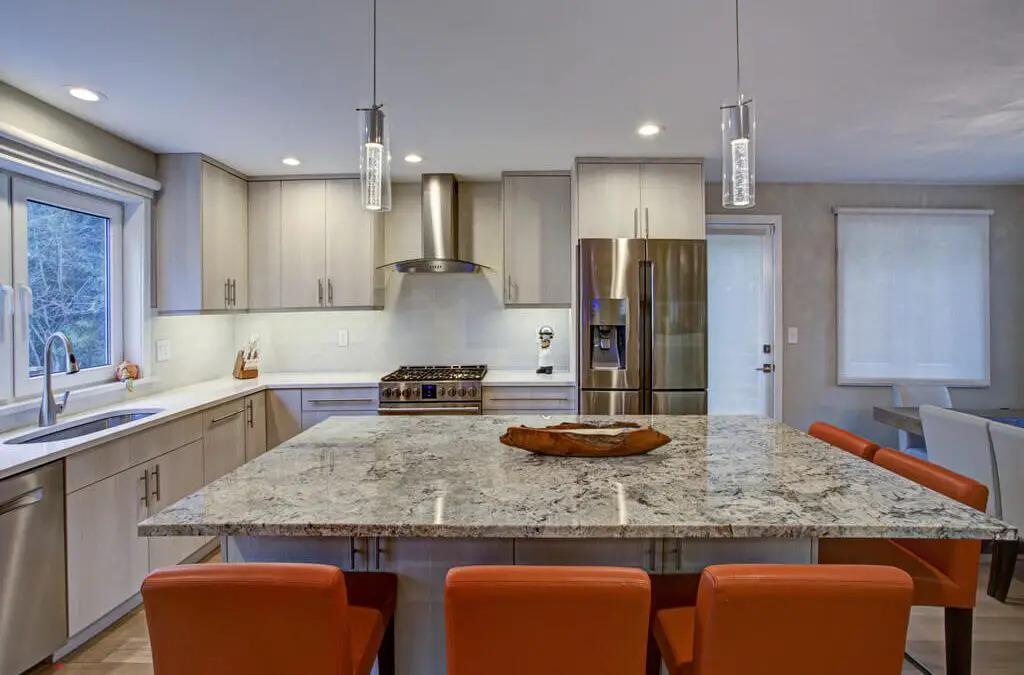Using natural stone in your kitchen is a durable and aesthetically appealing choice. Granite countertops, for example, are heat-resistant, stain-resistant, and unlikely to crack or chip.
Additionally, natural stone adds a touch of elegance with various color tones and patterns to complement your kitchen design. It is essential to properly care for and regularly seal natural stone countertops to maintain their beauty. With its unique and nonporous properties, quartz is another popular option that requires minimal maintenance.
In this guide, we will explore different types of natural stones and their suitability for kitchen countertops, helping you make an informed decision for your kitchen renovation.

Benefits Of Using Natural Stone In Your Kitchen
Natural stone is popular for kitchen countertops and surfaces due to its numerous benefits. Whether you’re renovating your kitchen or building a new one, using natural stone can enhance the beauty and functionality of your space. Let’s explore some of the critical advantages of incorporating natural stone in your kitchen:
Durability And Heat Resistance
One of the primary benefits of using natural stone in your kitchen is its exceptional durability. Raw stone materials like granite and quartzite are known for their strength and ability to withstand heavy use in busy kitchens. They are incredibly resistant to scratches, chips, and cracks, ensuring that your countertop remains intact for years.
Moreover, natural stone is highly heat-resistant, making it an ideal choice for kitchen surfaces. Whether placing hot pots and pans or using kitchen appliances, you can have peace of mind knowing that your natural stone countertop won’t be damaged by heat.
Versatility And Aesthetic Appeal
Another advantage of choosing natural stone for your kitchen is its versatility and aesthetic appeal. Natural stone comes in various colors, patterns, and textures, allowing you to find the perfect fit for your kitchen design. From the timeless elegance of granite to the modern sophistication of quartz, natural stone can complement any style or theme.
Not only does natural stone offer visual charm, but it also adds a touch of luxury to your kitchen space. The unique veining and natural variations in each stone slab create a one-of-a-kind look that cannot be replicated. With natural stone, you can make a stunning focal point in your kitchen to impress your family and guests.
Low Maintenance And Longevity
When it comes to kitchen surfaces, ease of maintenance is paramount. Natural stone excels in this aspect, requiring minimal maintenance and upkeep. Regular sealing allows your natural stone countertop to resist stains and remain in excellent condition for many years.
In addition to being low-maintenance, natural stone is also known for its longevity. Unlike synthetic materials, such as laminate or acrylic, natural stone can withstand the test of time and retain its beauty. Investing in a natural stone countertop means you won’t have to worry about frequent replacements or repairs.
In conclusion, using natural stone in your kitchen offers numerous benefits, from durability and heat resistance to versatility and aesthetic appeal. With its low maintenance requirements and long lifespan, natural stone is a wise choice that will elevate the style and functionality of your kitchen for years to come.

Types Of Natural Stone For Kitchen Countertops
Discover the perfect natural stone for your kitchen countertops with our comprehensive guide. From durable granite to elegant quartzite, we’ll help you choose the best option to enhance your kitchen design. Say goodbye to stains and worries with these stunning and long-lasting natural stone countertops.
Types of Natural Stone for Kitchen Countertops
Natural stone is a popular choice when selecting the perfect material for your kitchen countertops. Natural stone adds beauty and elegance to your kitchen and offers durability and longevity. Several types of natural stone are commonly used for kitchen countertops, each with its own unique characteristics. This section will explore the different kinds of natural stone and their suitability for your kitchen.
Granite
Granite is considered one of the best options for natural stone kitchen countertops. It is known for its durability and strength, making it resistant to scratches, heat, and impact. Granite also offers a wide range of colors and patterns, allowing you to find the perfect match for your kitchen design. With proper care and regular sealing, granite countertops can last for decades.
Quartzite
Quartzite is another popular choice for kitchen countertops. It is a natural stone formed from sandstone and undergoes a natural transformation due to heat and pressure. Quartzite is highly durable and resistant to heat, scratches, and stains, making it an ideal option for busy kitchens. It comes in various colors, from whites to greys, and often features beautiful veining patterns that add a touch of elegance to your kitchen.
Marble
Marble is renowned for its timeless beauty and elegance. It is a softer natural stone than granite and quartzite, making it more susceptible to scratches and stains. However, marble countertops can last a lifetime with proper care and regular maintenance. Marble is available in a wide range of colors and veining patterns, offering your kitchen a luxurious and sophisticated look.
Soapstone
Soapstone is a unique natural stone valued for its rustic charm and heat resistance. It has a smooth and silky texture, making it a pleasure to touch. Soapstone countertops are known for their ability to withstand high temperatures without damage, which makes them perfect for kitchen use. While soapstone is not as hard as granite or quartzite, it can be easily repaired if scratches or chips occur.
Travertine
Travertine is a type of limestone that is often used for kitchen countertops. It features a unique, porous texture and is available in various earth-tone colors. Travertine countertops can create a warm and inviting atmosphere in your kitchen. However, it is essential to note that travertine is more susceptible to staining and requires regular sealing to maintain its beauty and durability.
In conclusion, when it comes to natural stone kitchen countertops, there are several options. Granite, quartzite, marble, soapstone, and travertine each offer benefits and visual appeal. Consider your preferences, lifestyle, and maintenance requirements when selecting the perfect natural stone for kitchen countertops.
Considerations For Using Natural Stone In Your Kitchen
Enhance the elegance of your kitchen with natural stone countertops. Discover the durability and beauty of granite, quartzite, and other stone options and tips for selecting the perfect stone to complement your kitchen design. Create a timeless and stunning space with the help of this comprehensive guide.
Budget And Cost
When considering using natural stone in your kitchen, it is essential to consider your budget and cost. Natural stone, such as granite or quartzite, can be more expensive than countertop materials. However, its durability and beauty make it a worthwhile investment. It is recommended to compare prices and consider the long-term benefits when deciding which natural stone to choose for your kitchen.
Installation And Maintenance
The installation process for natural stone countertops requires professional expertise. Hiring a skilled installer with experience working with natural stone is crucial to ensuring a proper and seamless installation. Additionally, natural stone requires regular maintenance to keep it looking its best. This includes cleaning with pH-neutral cleaners and possibly resealing the stone periodically to protect it from stains and damage.
Sealing And Stain Resistance
One of the critical considerations when using natural stone in the kitchen is its sealing and stain-resistance properties. Most natural stone countertops, like granite, are porous and can absorb liquids if not properly sealed. Regular sealing helps to protect the stone from stains and spills. However, it is essential to note that some natural stones may still be prone to staining even with sealing. It is advisable to wipe up spills immediately to minimize the risk of staining.

Frequently Asked Questions For A Guide To Using Natural Stone In Your Kitchen
Is Natural Stone Good For the Kitchen?
Natural stone suits kitchens because it is durable, stain-resistant, and can withstand heavy use. Granite, in particular, is an optimal choice as it is challenging, heat-resistant, and less likely to crack or chip. Other natural stone options, like quartz, are nonporous and do not stain.
What Is The Most Durable Natural Stone For Kitchen?
Granite is the most durable natural stone for kitchen countertops. It is challenging, stain-resistant, heat-resistant, and unlikely to crack or chip. With various colors and patterns available, granite enhances the beauty of your kitchen.
What Are The Disadvantages Of Natural Stone Countertops?
Natural stone countertops have a few disadvantages. First, each piece is unique, so it may be challenging to find a perfect match if you need to replace or repair a section. Second, natural stone countertops can be expensive, requiring professional installation.
Lastly, they need regular sealing to maintain their durability and appearance.
Which Natural Stone Is Best For Kitchen Countertops?
Granite is widely considered the best natural stone for kitchen countertops. It is challenging, stain-resistant, heat-resistant, and less likely to crack or chip. Granite countertops come in various colors and patterns, adding beauty to the kitchen design.
Conclusion
Incorporating natural stone into your kitchen can add beauty and durability. Choosing a suitable rock, such as granite or quartz, can provide a stain-resistant and heat-resistant surface that will withstand heavy use. While natural stone may require regular sealing and can be a bit pricey, its unique patterns and colors make it worth the investment.
So, enhance your kitchen with the timeless elegance of natural stone countertops.

Hi, I’m Esrat, and I’m so glad that you found me here at Happy Food Kitchen! I started Happy Food Kitchen in 2023 to have a creative, right-brained outlet to balance my very left-brained career in genetics.




